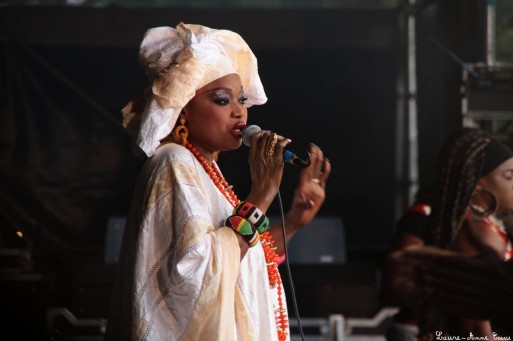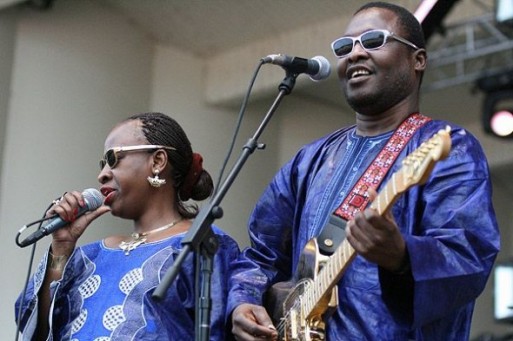
Grammy winner Oumou Sangare performing “Africa Stop Ebola”
(credit: igrooveradio.com)
The word Ebola evokes fear, suspicion and mistrust. Ebola is highly contagious, painful and often ends in death. It begins with symptoms most of us have experienced before: fever, sore throat, muscle pain, headaches, vomiting, diarrhea. But with Ebola, it does not stop there. As the disease progresses, kidney and liver functions begin to shut down and the victim hemorrhages internally and externally. The average survival rate is only 50%. According to Centers for Disease Control and Prevention, there have been 8,259 confirmed Ebola deaths since the beginning of the 2014 West Africa outbreak. Ebola has brought grief and wreaked havoc on the African economy. Thousands of children became orphaned and abandoned by relatives fearful of acquiring the deadly disease. “The fear surrounding Ebola is becoming stronger than family ties,” states Manuel Fontaine, UNICEF Regional Director for West & Central Africa. “We need more courage, more creativity, and far far more resources.”
We need the information to reach everywhere because I think that art and culture is the shortest route to communicate with these villagers so that they understand the importance of being able to avoid this scourge.
— Mory Kante
Ebola has left a bloody trail of death and loss. It’s the stuff of nightmares. But can hope grow out of this nightmare? It did. In October of 2014, a group of legendary West African musicians got together and created “Africa Stop Ebola,” a song with a soulful reggae sound that raises funds for Doctors Without Borders, an international health organization working on the forefront of Ebola-stricken countries.

Amadou and Mariam performing “Africa Stop Ebola”
Credit: sapeople.com
“Africa Stop Ebola” is collaboration between Malian musicians Amadou & Mariam, Salif Keita, Oumou Sangaré and Kandia Kouyaté, the Guinean singers Mory Kante and Sia Tolno, the Ivorian reggae star Tiken Jah Fakoly, the Congolese vocalist Barbara Kanam and the Senegalese rapper Didier Awadi. Carlos Chiniros, an instructor at New York University specializing in media and social development, contributed information to the lyrics. Recorded mostly in France, the song was produced by a French company, 3D Family, and sung in French and local African languages. In addition to raising money for treatment and prevention of Ebola, this song instructs the listeners about how they can protect themselves from this disease and offers hope that Ebola can be stopped. The song is available on iTunes and was distributed to radio stations across Africa while the video was broadcast on European and African television stations. Chiniros told The Guardian that he hopes “Africa Stop Ebola” helps to accomplish two things: send hope to the affected areas and “rebuild people’s trust in the health services in their countries,” since misinformation and myths surrounding Ebola have contributed to the spread of disease. In the words of Mory Kante, “We need the information to reach everywhere because I think that art and culture is the shortest route to communicate with these villagers so that they understand the importance of being able to avoid this scourge.”
We need more courage, more creativity, and far far more resources.
— Manuel Fontaine
The song’s message to the citizens of Liberia, Guinea and Sierra Leone is simple and clear: wash your hands, don’t touch the sick and the dead, trust your doctor, if you are sick — go to the hospital before the symptoms get worse. While grief is palpable in the song, “Africa is full of sadness to see our families die,” Oumou Sangare’s voice echoes with encouragement, “But we will stay up, sooner or later we will beat you.” And through the reprise of “Ebola, Ebola,” Fakoly assures with sincerity that “The doctor will help you. Trust the doctors.” In the five and a half minutes of the music video, the rhythms and the voices blend together, making the horrible word “Ebola” sound almost beautiful, compelling the listener to hear the song one more time instead of focusing on fear. It dispels the stigma. There is no shame in “Africa Stop Ebola,” only humanness.
Watch “Africa Stop Ebola” video here:

 “Africa Stop Ebola” — A Song of Hope and Caring
“Africa Stop Ebola” — A Song of Hope and Caring


 Recovering Cremation Remains After the Los Angeles Fires
Recovering Cremation Remains After the Los Angeles Fires
 “As Tears Go By” by Marianne Faithfull
“As Tears Go By” by Marianne Faithfull
 “The Sea” by John Banville
“The Sea” by John Banville














